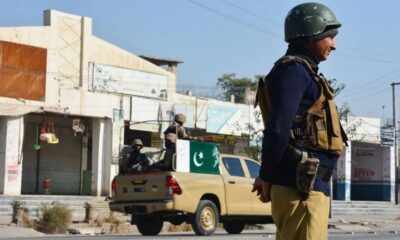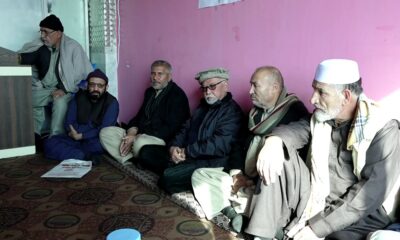World
Heated discussion held during UNSC meeting over possibility of biochemical weapons
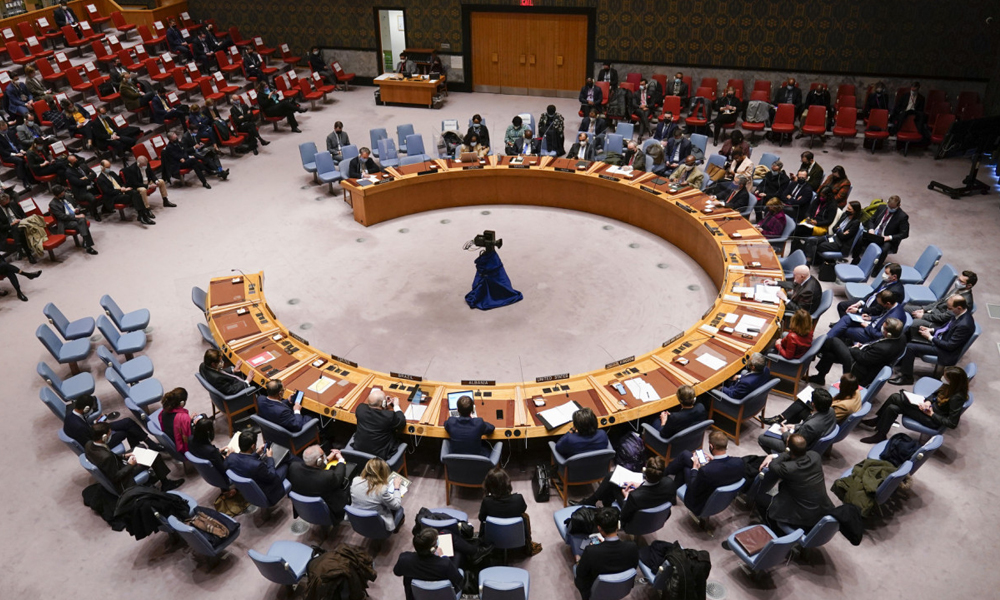
Washington’s ambassador to the UN, Linda Thomas-Greenfield, on Friday warned Russia’s claim that the US is funding “military biological activities” in Ukraine could be a pretext for Moscow launching its own biological weapons attack on Ukraine.
Thomas-Greenfield made the comments during a UN Security Council meeting that had been called at Russia’s request to discuss Moscow’s claims that Ukraine is secretly developing biological weapons with the help of the US.
As reported by the Guardian, the event saw some heated discussion.
The Russian ambassador to the UN, Vasily Nebenzya, evoked the terrifying specter of an “uncontrolled spread of bio agents from Ukraine” across Europe, but Thomas-Greenfield responded that Russia’s claim could be a pretext for launching its own biological weapons attack on Ukraine.
This came after the Russian ministry of foreign affairs posted a tweet last Sunday accusing the US and Ukrainian governments of running a secret “military-biological programme” inside the war-ravaged country.
Moscow claimed that its invading forces had discovered evidence of an “emergency clean-up” to hide the programme.
Moscow went on to claim that it had found documents related to the secret US operation in laboratories in the Ukrainian cities of Kharkiv and Poltava.
The Guardian reported that these allegations were quickly amplified by China, which supported the claims during Friday’s UN security council debate.
However, both the US and Ukraine have denied that they are developing any biological weapons inside the country.
At Friday’s meeting, Thomas-Greenfield, said: “I will say this once: ‘Ukraine does not have a biological weapons program.’” She went on to turn the accusation back on Moscow. “It is Russia that has long maintained a biological weapon program in violation of international law,” the Guardian reported.
The UN high commissioner for disarmament, Izumi Nakamitsu, confirmed that the UN was not aware of any biological weapons programmes in Ukraine.
However, the Guardian reported that Ukraine does operate biological laboratories which receive US funding.
The US undersecretary of state Victoria Nuland affirmed these facts in a Senate foreign relations committee hearing last week in which the Republican senator Marco Rubio asked her directly whether Ukraine had biological weapons, the Guardian reported.
Nuland did not answer the question directly but said: “Ukraine has biological research facilities.”
She also said there was concern that Russian forces were trying to gain control of the labs. “We are working with the Ukrainians on how they can prevent any of those research materials from falling into the hands of Russian forces.”
According to the Guardian, US funding to the laboratories had its roots in the fall of the Soviet Union after which money was pumped into Ukraine and other former Soviet countries to help them transfer scientific skills away from weapons programs towards public health initiatives.
The scheme was originally known as the Cooperative Threat Reduction (CTR) program, but is now more commonly referred to as the biological engagement program. It has been successful in supporting former Soviet and other countries to fulfil public health obligations, the Guardian reported.
“This is one of the best things that we do,” Dr Gigi Gronvall, senior scholar at Johns Hopkins Center for Health Security, told the Guardian.
Most of the work of the Ukraine labs today, Gronvall said, involved surveillance of diseases in animals and people as an early-warning system for illnesses such as African swine fever, which is endemic in the region. “We know pathogens don’t respect borders, so helping to put out public health fires before they become too big is an advantage to all of us,” she said.
However, the Guardian reported that as part of their work researching diseases the bio labs do seem to hold dangerous pathogens.
According to the report, the World Health Organization (WHO) is urging Ukraine to destroy any highly dangerous agents in its laboratories to avoid the risk of a disastrous outbreak should one of the labs come under Russian attack.
“As part of this work, WHO has strongly recommended to the ministry of health in Ukraine and other responsible bodies to destroy high-threat pathogens to prevent any potential spills,” the UN health agency said.
The WHO has worked in Ukraine for several years helping the bio labs improve their safety and security, so it knows what it is talking about, the Guardian reported.
However, the report stated that in addition to the threat of pathogens held in Ukrainian labs leaking out or falling into the hands of Russian forces, there is the threat of Russia potentially launching its own biological weapons attack.
The assessment of the US state department is that Russia continues to maintain an offensive biological weapons programme in violation of the convention that it has signed.
Earlier this week, the White House press secretary, Jen Psaki, accused Russia under Vladimir Putin of having a “long and well-documented track record” of using chemical weapons, pointing to the poisoning of the opposition leader Alexei Navalny and Russia’s support of the Syrian regime while it deployed chemical weapons.
She went on to warn that Moscow’s claim of a secret biological weapons programme in Ukraine could in fact be laying the foundations for a Russian chemical or biological weapons assault inside Ukraine, the Guardian reported.
World
Biden approves $571 mln in defense support for Taiwan

U.S. President Joe Biden on Friday agreed to provide $571.3 million in defense support for Taiwan, the White House said, while the State Department approved the potential sale to the island of $265 million worth of military equipment.
The United States is bound by law to provide Chinese-claimed Taiwan with the means to defend itself despite the lack of formal diplomatic ties between Washington and Taipei, to the constant anger of Beijing, Reuters reported.
Democratically governed Taiwan rejects China's claims of sovereignty.
China has stepped up military pressure against Taiwan, including daily military activities near the island and two rounds of war games this year.
Taiwan went on alert last week in response to what it said was China's largest massing of naval forces in three decades around Taiwan and in the East and South China Seas.
Biden had delegated to the secretary of state the authority "to direct the drawdown of up to $571.3 million in defense articles and services of the Department of Defense, and military education and training, to provide assistance to Taiwan," the White House said in a statement without providing details.
Taiwan's defense ministry thanked the United States for its "firm security guarantee", saying in a statement the two sides would continue to work closely on security issues to ensure peace in the Taiwan Strait.
The Pentagon said the State Department had approved the potential sale to Taiwan of about $265 million worth of command, control, communications, and computer modernization equipment.
Taiwan's defense ministry said the equipment sale would help upgrade its command-and-control systems.
Taiwan's defense ministry also said on Saturday that the U.S. government had approved $30 million of parts for 76 mm autocannon, which it said would boost the island's capacity to counter China's "grey-zone" warfare.
World
Trump-backed spending deal fails in House, shutdown approaches

A spending bill backed by Donald Trump failed in the U.S. House of Representatives on Thursday as dozens of Republicans defied the president-elect, leaving Congress with no clear plan to avert a fast-approaching government shutdown that could disrupt Christmas travel.
The vote laid bare fault lines in Trump's Republican Party that could surface again next year when they control the White House and both chambers of Congress, Reuters reported.
Trump had pressured lawmakers to tie up loose ends before he takes office on Jan. 20, but members of the party's right flank refused to support a package that would increase spending and clear the way for a plan that would add trillions more to the federal government's $36 trillion in debt.
"I am absolutely sickened by a party that campaigns on fiscal responsibility and has the temerity to go to the American people and say you think this is fiscally responsible," said Republican Representative Chip Roy, one of 38 Republicans who voted against the bill.
The package failed by a vote of 174-235 just hours after it was hastily assembled by Republican leaders seeking to comply with Trump's demands. A prior bipartisan deal was scuttled after Trump and the world's richest person Elon Musk came out against it on Wednesday.
Republican House Speaker Mike Johnson provided no details when reporters asked him about next steps after the failed vote.
"We will come up with another solution," he said.
Government funding is due to expire at midnight on Friday. If lawmakers fail to extend that deadline, the U.S. government will begin a partial shutdown that would interrupt funding for everything from border enforcement to national parks and cut off paychecks for more than 2 million federal workers. The U.S. Transportation Security Administration warned that travelers during the busy holiday season could face long lines at airports.
"Congress must get rid of, or extend out to, perhaps, 2029, the ridiculous Debt Ceiling. Without this, we should never make a deal," Trump said in a post on Truth Social hours after the bill failed.
Thursday's unsuccessful bill largely resembled the earlier version that Musk and Trump had blasted as a wasteful giveaway to Democrats. It would have extended government funding into March and provided $100 billion in disaster relief and suspended the debt. Republicans dropped other elements that had been included in the original package, such as a pay raise for lawmakers and new rules for pharmacy benefit managers.
At Trump's urging, the new version also would have suspended limits on the national debt for two years -- a maneuver that would make it easier to pass the dramatic tax cuts he has promised.
Johnson before the vote told reporters that the package would avoid disruption, tie up loose ends and make it easier for lawmakers to cut spending by hundreds of billions of dollars when Trump takes office next year.
"Government is too big, it does too many things, and it does few things well," he said.
TEEING UP TAX CUT
Democrats blasted the bill as a cover for a budget-busting tax cut that would largely benefit wealthy backers such as Musk, the world's richest person, while saddling the country with trillions of dollars in additional debt.
"How dare you lecture America about fiscal responsibility, ever?" House Democratic Leader Hakeem Jeffries said during floor debate.
Even if the bill had passed the House, it would have faced long odds in the Senate, which is currently controlled by Democrats. The White House said Democratic President Joe Biden did not support it.
Previous fights over the debt ceiling have spooked financial markets, as a U.S. government default would send credit shocks around the world. The limit has been suspended under an agreement that technically expires on Jan. 1, though lawmakers likely will not have to tackle the issue before the spring.
When he returns to office, Trump aims to enact tax cuts that could reduce revenues by $8 trillion over 10 years, which would drive the debt higher without offsetting spending cuts. He has vowed not to reduce retirement and health benefits for seniors that make up a vast chunk of the budget and are projected to grow dramatically in the years to come.
The last government shutdown took place in December 2018 and January 2019 during Trump's first White House term.
The unrest also threatened to topple Johnson, a mild-mannered Louisianan who was thrust unexpectedly into the speaker's office last year after the party's right flank voted out then-Speaker Kevin McCarthy over a government funding bill. Johnson has repeatedly had to turn to Democrats for help in passing legislation when he has been unable to deliver the votes from his own party.
He tried the same maneuver on Thursday, but this time fell short.
Several Republicans said they would not vote for Johnson as speaker when Congress returns in January, potentially setting up another tumultuous leadership battle in the weeks before Trump takes office.
World
North Korean troops suffer 100 deaths, struggling in drone warfare, South Korea says
More than 10,000 North Korean troops have been deployed to help Russia in the war, according to U.S. and South Korean officials.
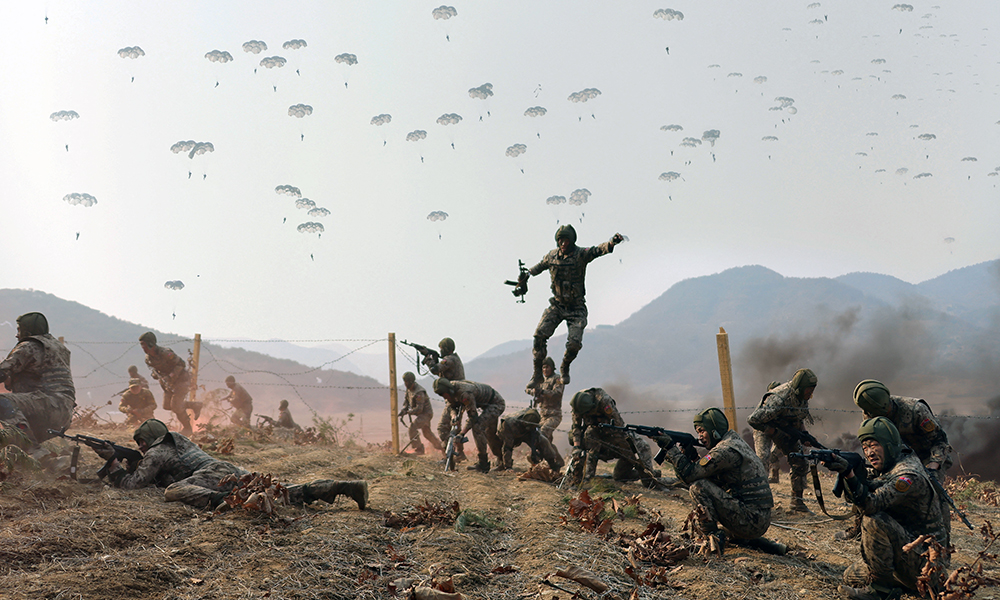
At least 100 North Korean troops deployed to Russia have been killed with another 1,000 injured in combat against Ukrainian forces in intense fighting in the Kursk region, Reuters cited a South Korean lawmaker said on Thursday citing the country's spy agency.
The heavy losses are attributed to the lack of experience by North Korean troops in drone warfare and unfamiliarity with the open terrain where they are taking part in the battle, a member of parliament Lee Seong-kweun told reporters.
Lee was speaking after a closed-door briefing by the National Intelligence Service (NIS) to parliament.
The discrepancy in the estimate of the troops killed from that made by a U.S. military official who cited several hundred casualties is because of the relatively conservative analysis by the NIS, Lee said.
"There was a report that there have been at least 100 deaths and the injured are approaching 1,000," he said.
There are indications that the North is preparing for additional deployment, Lee said, including intelligence of the country's leader Kim Jong Un overseeing training, read the report.
The report echoed comments by U.S. and Ukrainian officials that North Korean losses are heavy and that Russia was using them in large numbers in assaults in Kursk, a Russian region where Ukraine launched a cross-border incursion in August.
More than 10,000 North Korean troops have been deployed to help Russia in the war, according to U.S. and South Korean officials. Pyongyang has also shipped more than 10,000 containers of artillery rounds, anti-tank rockets as well as mechanised howitzers and rocket launchers.
Neither the North nor Russia have officially acknowledged the troop deployment or the weapons supply.
Russian President Vladimir Putin visited Pyongyang in June and signed a "comprehensive strategic partnership" treaty with North Korean leader Kim Jong Un that included a mutual defence pact.
Earlier on Thursday, North Korea said its military alliance with Russia is proving "very effective" in deterring the United States and its "vassal forces," denouncing a recent statement by Washington and allies against ties between Pyongyang and Moscow, Reuters reported.
North Korea made no mention of its involvement in the war in Ukraine or casualties.
Instead it denounced a statement by the United States and nine countries and the European Union issued on Monday as "distorting and slandering the essence of the normal cooperative relations" between the North and Russia.
In a statement by an unnamed foreign ministry spokesman, the North blamed Washington and its allies for prolonging the Ukrainian war and destabilising the security situation in Europe and Asia-Pacific.
"It is because of the misguided acts of the U.S. and the West persisting in their structure-destructive, hegemony-oriented and adventuristic military policy," it said.
-

 Sport5 days ago
Sport5 days agoATN once again seals deal to broadcast upcoming IPL across Afghanistan
-
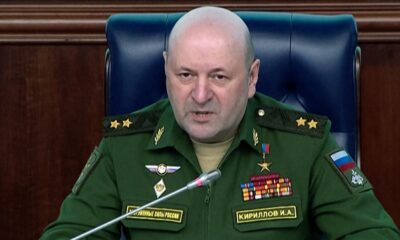
 Regional5 days ago
Regional5 days agoBomb kills chief of Russian nuclear protection forces in Moscow
-

 Sport5 days ago
Sport5 days agoLanka T10: All three matches abandoned due to rain
-

 Latest News5 days ago
Latest News5 days agoIndia hoping to import coal and marble from Afghanistan
-

 Sport4 days ago
Sport4 days agoZimbabwe’s opening ODI against Afghanistan abandoned
-

 Latest News5 days ago
Latest News5 days agoFuel prices rise in Herat as winter approaches
-

 Latest News5 days ago
Latest News5 days agoJapan announces $27.5 million aid package to Afghanistan
-

 Latest News3 days ago
Latest News3 days agoTwo horror accidents on Kabul-Kandahar highway leave 52 dead










